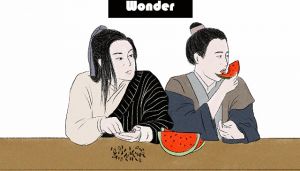Eating Melons
来自China Digital Space
Chī Guā | 吃瓜

Consuming the latest gossip, from a distance. Incidents become meme-like "melons," which are then "eaten" by those following along on the internet. As opposed to "surround and watch," which implies the application of scrutiny to events of public interest, "eating melons" connotes the private enjoyment of drama, a la "sipping tea" in American parlance.
The phrase has its roots in 2016. Netizens combined the idle melon-eating crowd of China's internet peanut galleries with an official formulation of ignorant public to create the
The popularity of "Eating melons" took of in early 2021 during a series of celebrity scandals, most notably a controversy over a famous actress' surrogacy and tax fraud. For a time, a mobile game with a tongue-in-cheek title nodding at the phrase, "Combine Big Watermelons" was among the most popular games in China.
After Nobel laureate Liu Xiaobo died in police custody in 2017, state media outlet Global Times wrote that it would stay up all night "eating melons with the public," in apparent glee.
In November 2021, the phrase briefly became a sensitive word after tennis star Peng Shuai accused former Politburo Standing Committee member Zhang Gaoli of sexual assault. Weibo users adopted "eating melons" and "gigantic melon" as stand-ins for discussions about Peng's plight in a vain attempt to evade censors. The terms was then censored. Although many took illicit joy in the cheeky discussion of "melons," others were dismayed by the corruption of language inherent in the phrases' adoption. "When a heart-wrenching accusation becomes a meme like 'a melon we commoners can’t eat,' they’ve already won," wrote on Douban user.
See Also
More from CDT




